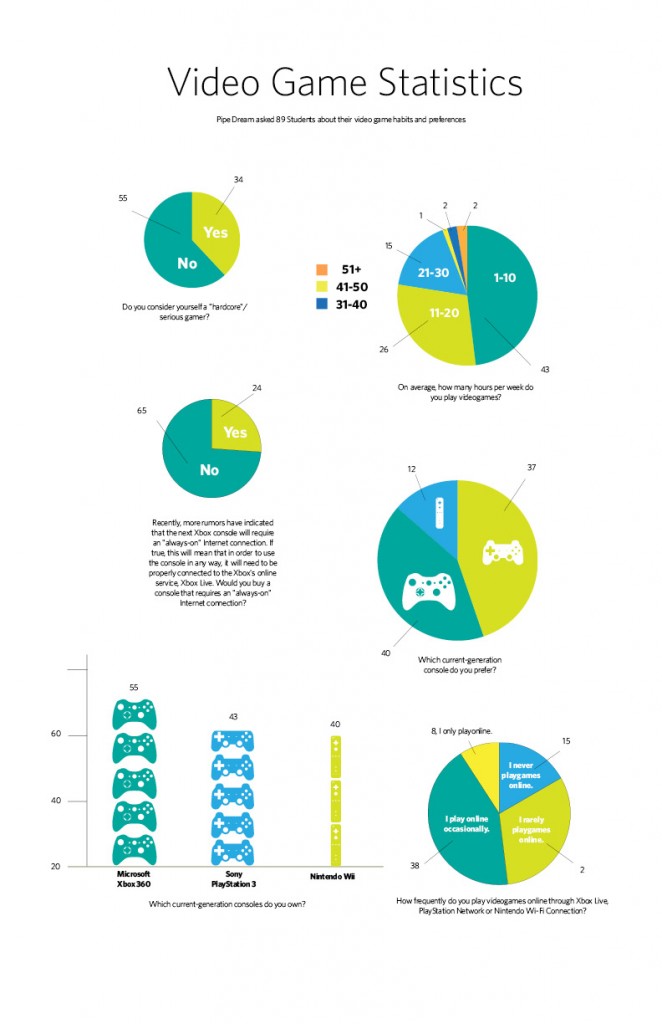The Xbox 360 successor is still only a rumor, but it’s already being overwhelmingly rejected by the campus gaming community.
The central issue is that, according to multiple rumors, the next Xbox will feature an always-online Internet requirement. This would mean that all games and apps on the console could only be used with a stable connection to the Internet, regardless of whether or not the games or apps even use the Internet.
On April 4, the gaming site Kotaku posted an article confirming prior anonymous reports of an always-on Xbox successor. In response, Microsoft Creative Director Adam Orth took to Twitter to defend always-on devices.
“Sorry, I don’t get the drama around having an ‘always on’ console. Every device now is ‘always on,’” Orth tweeted. This and his other tweets seemed to disparage rural towns or places with poor Internet quality. Orth’s comments quickly became the lightning rod for gamers’ discontent with encroaching online services. After the harsh backlash, Orth made his Twitter account private. On April 10, Orth resigned from his position at Microsoft.
If the massive reaction to Orth’s comments is any indication, there’s a large portion of the gaming community that doesn’t support the idea of an always-on console.
A common complaint with always-on consoles and games is that their longevity depends on the game publisher. Always-on devices require publisher-operated servers to run continuously. If a publisher decides that the cost to maintain the servers isn’t worth the profit made from selling the device, then the servers are likely to be shut down, rendering the device unusable. An always-online console would essentially come with an expiration date on it. Sharing “old favorites” or playing “retro” games could be a thing of the past.
So, why would Microsoft even consider making its new Xbox always online? It may have to do with two of the video game industry’s biggest perceived threats: piracy and used games.
While piracy isn’t nearly as widespread on consoles as it is on PC, it can still happen. If a game is streamed over the Internet instead of existing on a physical disc, it’s much harder to copy and share with others.
The used-game market has confounded the video game industry. Game publishers don’t see a cent for used game sales and, unfortunately for them, buying used games is hugely popular among consumers. With completely online gaming, games would be tied to single consoles, making them impossible to resell. This tactic could kill the used game market and force consumers to buy new copies of games if they wanted to use the new console.
An always-on device also fits with Microsoft’s apparent goal of changing the Xbox from a gaming console to a general media device. If the most recent batch of rumors are to be believed, the next Xbox will be able to interact with TVs and cable boxes. Gaming and television services would be combined to one device. In order to maintain streaming and TV signals, the console would need to be always-online.
With such a controversial issue, Release performed its own survey via B-Line to see how Binghamton’s gamers felt about an always online console and the reaction was largely negative. Despite the Xbox 360 being the most-owned and most-preferred current-generation console, 61 of the 88 total respondents said they would not buy an always-online console.
Tyler Esford, a sophomore majoring in electrical engineering, worries about the accessibility of an always-online console.
“I believe that requiring a console to be always online ignores the fact that reliable high speed Internet is not as widespread as people seem to think,” Esford said.
Of the 23 written responses, none were favorable towards an always-online console. If the survey results demonstrate anything, it’s that the next Xbox will face some hostility from much of its consumer base. It will also have to deal with stiff competition from the Sony PlayStation 4 and the Nintendo WiiU, neither of which require an always-on Internet connection.
Still, Microsoft has remained completely silent on its next Xbox. Without so much as an official date for when the console will be announced, recent rumors (what would we do without them?) have pointed to the end of May for the reveal. Until then, the unannounced console is at the mercy of anonymous sources, speculation and disgruntled gamers. If the rumors are true, and the Xbox 360’s successor requires an always-on Internet connection, Microsoft has a steep uphill battle ahead of it.



